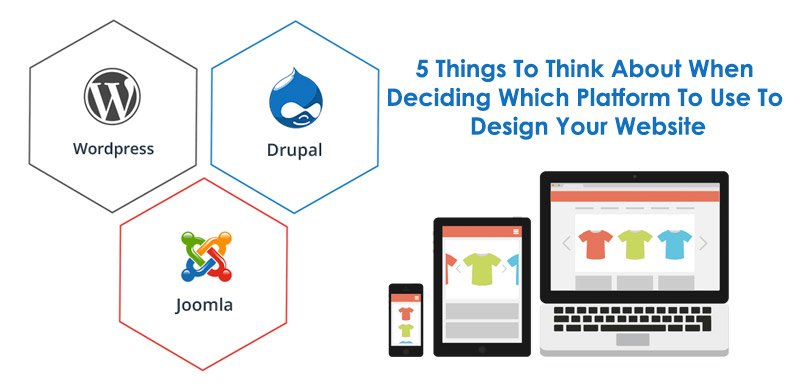Choosing a platform for your new website is one of the most critical decisions you will make. This is because the platform you select can influence everything from the design and hosting costs you pay to the flexibility you have with your site design to the freedom (or lack thereof) you have to make changes on your own.
In this article, learn five key things to consider before you choose a website building platform for your new website.
Tip 1: What is your level of technical skill?
Three of the most popular website builder options, WordPress, Joomla and Drupal, are all free to download and use. But while WordPress is geared towards web masters with less technical expertise, Joomla and Drupal tend to require a higher skill level.
Perhaps this is why an estimated 50 percent of all websites in use today are built using the WordPress platform.
However, in Joomla’s and Drupal’s defense, each has their own set of perks and pros. Joomla is particularly good for integrating social networking and e-commerce solutions. Drupal is arguably the most powerful website builder of the three.
How to decide:
Since all three builder tools are free to use, it really boils down to how keen you are to learn more about internet technology (or how far your budget will stretch to hire someone to do the same).
Tip 2: What do you hope to accomplish with your new website?
Each website builder is designed to play to a different set of strengths. While it is possible to use any of the three builders for anything you want to do online, you will have an easier time with setup and updates if you select the site builder that most closely matches your desired objectives and outcomes.
Here is what each builder states as its key strengths:
WordPress – WordPress first rose to prominence as a tool for creating a free blog. Here, it is important to distinguish between WordPress.com, the totally free blog solution where the software is hosted by WordPress, and WordPress.org, the totally free blog solution where the software is hosted by a web hosting provider. The former is easier to launch but the latter gives you more future flexibility.
Joomla – Joomla is all about social networking and e-commerce solutions. Unlike with WordPress, however, there is no Joomla-hosted option so you will need to choose a web hosting option that supports Joomla.
Drupal – Drupal can do anything your level of technical skill permits. Here again, there is no Drupal-hosted option so you will need to choose a web hosting option that supports Drupal.
How to decide:
If you are in a big hurry, WordPress.com can get you up and running in minutes – literally. If you have more time and a willingness to learn, self-hosting the software for your chosen builder will ensure you retain full control over your site and files and can use your website for any purpose.
Tip 3: What level of site traffic do you anticipate?
Since Google bases browser results on page load time as well as mobile friendliness and query relevance, it is vital to think through your level of anticipated site traffic. Smaller websites will do well with WordPress or Joomla, but if you think your site is going to blow up, you may want to opt for Drupal, which has a reputation for faster-loading pages.
But Drupal can also feel like putting a sports car engine into a student driver’s sedan if you anticipate lighter site traffic. In this case, too much power in inexperienced hands is not always a good thing.
How to decide:
Try to match the power of the website builder you choose with the demands you anticipate visitors will make on your site capacity (i.e. WordPress and Joomla are both perfectly adequate for small to mid-sized blogs and websites, but Drupal’s growth potential is unlimited).
Tip 4: Will you be storing very sensitive data on your site?
Website security is a topic that can’t be discussed enough in today’s open source website builder communities. Because Drupal requires a higher level of technical expertise and comes with its own in-house security reports, fewer hackers tend to target Drupal sites.
Here, WordPress’s very popularity works against it. Since WordPress is used by approximately half of today’s active websites, accomplished hackers can often make short work of a WordPress site, even one with extra security plugins.
How to decide:
Drupal comes with inbuilt security at the enterprise level (perhaps this is why Whitehouse.gov and many other federal websites opt for Drupal). But if you aren’t the federal government, you may find your security needs adequately met with WordPress or Joomla.
Tip 5: How involved do you want your site to be?
Websites built around a blog page tend to have fewer pages total than websites built primarily for e-commerce or news media website. WordPress is ideal for sites where a blog is prominent, while Drupal is the builder of choice for massive government and news websites. Joomla sits right in between the two, offering a happy midpoint.
How to decide:
If you anticipate a site with fewer total pages and a less complex navigation, you will likely be just fine with WordPress or even Joomla. For a highly complex website with deep navigation, you may want to opt for Drupal instead.
There is no one right or wrong answer to any of the five things to consider listed here. But if you haven’t already chosen a website platform and you have very specific objectives and goals for your new website, you may find that one platform is simply a closer match for your needs than the others. And since the price (free) is right for all three options, you really can’t go wrong!










